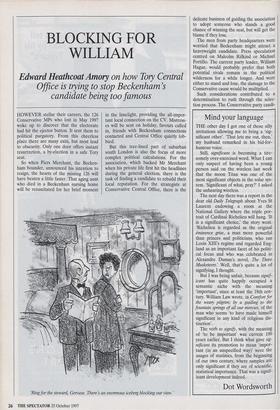Mind your language
THE other day I got one of those silly invitations allowing me to bring a 'sig- nificant other'. 'That lets me out, then,' my husband remarked in his bid-for- humour voice.
Still, significant is becoming a tire- somely over-exercised word. What I can only suspect of having been a young person said on the wireless last week that the moon Titan was one of the most significant objects in the solar sys- tem. 'Significant of what, pray?' I asked the unhearing wireless.
The next day there was a report in the dear old Daily Telegraph about Yves St Laurent endowing a room at the National Gallery where the triple por- trait of Cardinal Richelieu will hang. 'It is a significant choice,' the story went. `Richelieu is regarded as the original eminence grise, a man more powerful than princes and politicians, who ran Louis XIII's regime and regarded Eng- land as an important facet of his politi- cal focus and who was celebrated in Alexandre Dumas's novel, The Three Musketeers.' Well, that's quite a lot of signifying, I thought.
But I was being unfair, because signif- icant has quite happily occupied a semantic niche with the meaning `important', since at least the 18th cen- tury. William Law wrote, in Comfort for the weary pilgrim; by a guiding to the fountain springs of all our mercies, of the man who seems `to have made himself significant in any kind of religious dis- tinction'.
The verb to signify, with the meaning of `to be important' was current 100 years earlier. But I think what gave sig- nificant its promotion to mean 'impor- tant (in an unspecified way)' were the usages of statistics, from the beginning of our own century, where samples are only significant if they are of scientific, statistical importance. That was a signif- icant development indeed.
Dot Wordsworth


















































































 Previous page
Previous page